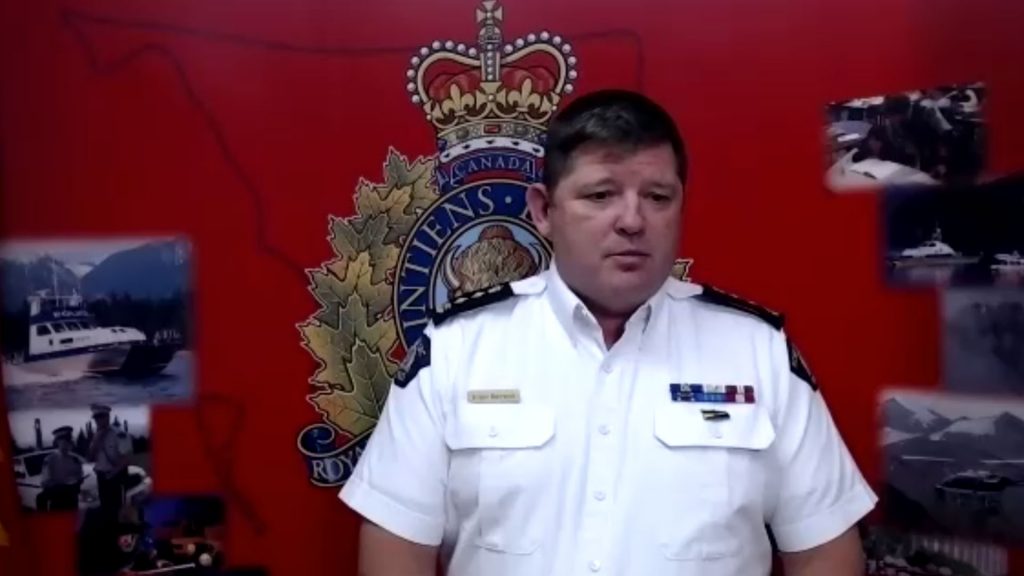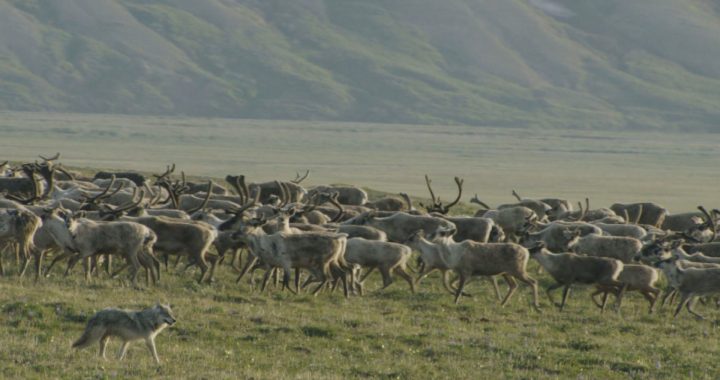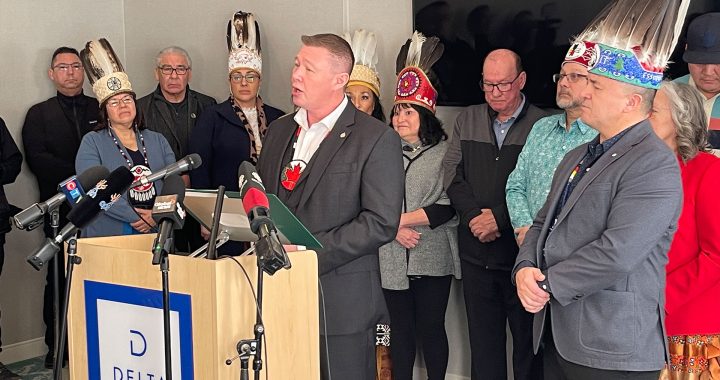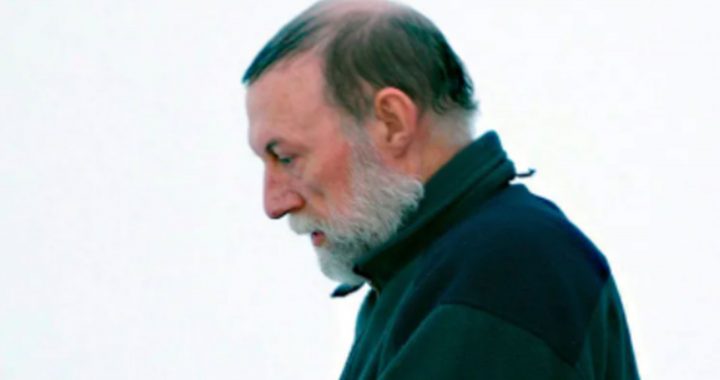
Chief Supt. John Brewer became the C-IRG's gold commander in 2021. The unit has been responsible for operations for Trans Mountain, Coastal GasLink and Teal-Jones. Photo: APTN
The top Mountie with the RCMP’s Community-Industry Response Group (C-IRG) in British Columbia says he “categorically” denies all allegations of misconduct and collusion with resource extraction companies being levelled at his squad.
Chief Supt. John Brewer joined the Nation to Nation podcast for a one-on-one interview where he addressed critics’ claims that his outfit is a pro-industry, politically motivated paramilitary outfit operating to protect oil, gas and timber firms at any and all cost.
“The allegation that we’re a secret organization of the RCMP is patently false. We drive marked police vehicles that have our name on the vehicle,” said Brewer. “The allegation that we’re there as an armed part of industry is false. The (reported) fact that we collaborate with industry to the detriment of protesters is false.”
Brewer was the silver commander in charge of operations when the squad was created in 2017 and tasked with monitoring and eventually countering resistance to the Coastal GasLink and Trans Mountain expansion pipeline projects.
The C-IRG has since moved into operations for other industries too. Brewer became gold commander in 2021.
N2N pushed back against Brewer’s argument, pointing out the B.C. RCMP offers only three paragraphs about the C-IRG on its website. Reliable information is hard to come by.
No one knows how many Mounties comprise the C-IRG, or where these officers are located. The unit has no set budget or designated jurisdiction. Wherever Indigenous people or environmental activists interfere with industry, the C-IRG pops up and acts to remove them.
Brewer insisted this regime is “not secretive.” He said the unit consists of volunteers, whose C-IRG deployments are secondary to their regular duties, meaning the number of cops working for the unit is fluid.
“Right now, C-IRG as a unit doesn’t have a set budget because our mandate is so flexible,” he said, meaning they don’t know how many events they’ll be deployed to, for how long, or much money they’ll need.
Others disagree. What Brewer calls “flexibility” opponents consider to be “unrestrained” freedom granted to the unit to operate without oversight or accountability.
Last week on N2N, Wet’suwet’en Hereditary Chief Na’Moks said Brewer’s Mounties “have no guidelines” and “aren’t being reined in.”
“Where else in this country do you have people with snipers?” he said. “Where else do you have dog units coming in? Where else do they come through your door with axes and power saws?”
Na’Moks was reacting to a recent APTN News investigation that probed the origins and allegations against the C-IRG.
Read more:
Behind the Thin Blue Line: Meet a secretive arm of the RCMP in B.C.
‘Unrestrained’ B.C. RCMP unit should be reined in or phased out, opponents say
APTN requested multiple interviews with the B.C. government to discuss issues of oversight and accountability. The province refused them all and refused to directly answer a dozen questions submitted in writing.
APTN asked both Brewer and the province if petroleum companies asked for extra protection prior to the unit’s creation. Neither answered.
B.C.’s former Liberal solicitor general, who was in charge of policing when the C-IRG was founded, told APTN he didn’t recall being briefed on or approving the new unit.
But Brewer disputed this, telling N2N his squad did receive approval from the provincial government. It also regularly receives approval to access emergency cash and relocate officers from other detachments.
“When the unit was conceived or proposed, it had to be approved at the highest levels,” he said. “It was a new unit, even though we were bringing in people from other units. And so yes, both the mandate and what the scope of operations would be (were approved).”
APTN’s investigation also obtained the unit’s founding policing plans, which show the C-IRG has been monitoring the law-abiding political activity of democratic groups who oppose pipeline construction.
Brewer responded with a simple message: “If people don’t want to have their views, thoughts or comments monitored, don’t put them online.”
“If you post things for the general public online, you expect people to read them. The police are people. We’re reading them,” he said. “We have on obligation as an intelligence-led police organization to gather as much information as we can, legally, and this is legal.”
Meanwhile, this week, the C-IRG’s operations drew what is now its second lawsuit alleging systematic lawbreaking, human rights violations and abuse of power by police.
Three members of the Wet’suwet’en Nation accuse the B.C. government and C-IRG of perpetrating an “organized campaign of intimidation and harassment” designed to scare Indigenous people off their own territory.
The claim filed June 22 also accuses pipeline builder Coastal GasLink and private security agency Forsythe Security, which is owned by an ex-Mountie who now provides services for the private sector, of colluding with the authorities in an illegal “conspiracy” of agitation and espionage.

It accuses the C-IRG of, among other things, conducting intrusive patrols multiple times per day, entering residential structures, shining high-beams and spotlights into buildings at night, following people on remote logging roads, using arbitrary detention, and destroying and seizing property.
“The police tactics described above and collectively referred to as the C-IRG campaign have had no lawful purpose or basis,” the suit alleges. “They have been unreasonable and excessive, discriminatory on the basis of race, malicious and an abuse of police powers.
“They represent an effort to suppress lawful activity and the assertion of Indigenous rights and title.”
The allegations have not been tested in court. Neither Coastal GasLink nor Forsythe Security responded to a request for a comment.
The plaintiffs are Wet’suwet’en members Janet Williams, Lawrence Bazil and Molly Wickham. The trio alleges their constitutional rights to occupy and use their territory have been trampled by “unlawful and overzealous” policing.
APTN’s investigation unearthed similar allegations dogging the unit in its operations against blockaders at Fairy Creek and the Tiny House Warriors occupation in the B.C. interior.
The Wet’suwet’en claim is the second ongoing legal proceeding in which the C-IRG is accused of widespread heavy handedness and illegality.
More than 100 people arrested during Fairy Creek logging blockades are seeking a stay of charges based on the claim the outfit perpetrated a “campaign of fear and violence” that was “so shocking” the court must condemn it to save its reputation.
A lower court judge previously accepted the claim of police misconduct — and cancelled an injunction because of it — but the ruling was overturned on appeal.
The allegations will be tested again in a new proceeding.

APTN also confirmed the C-IRG works closely with and receives intelligence from a growing network of senior ex-Mounties working for resource extraction companies.
Last fall, in an effort to strengthen a case against a Wet’suwet’en hereditary chief, the C-IRG relied in court on an incident report written by a Forsythe Security agent contracted by Coastal GasLink.
Last summer, Mounties helped a private eye hired by Teal-Jones infiltrate Fairy Creek blockade camps to conduct covert espionage operations, court files show. The timber firm’s spies conducted several surreptitious surveillance missions throughout the summer.
Whether this is illegal hasn’t been addressed by the court. Brewer argued this, too, is acceptable police conduct.
The RCMP is also facing a third lawsuit, this one launched by Tiny House Warriors spokesperson Kanahus Manuel. Her camp was the first to face off with the C-IRG in 2018 shortly after it was created.
She alleges a Mountie broke her wrist while applying a wrist lock technique during an arrest.
This claim also has not been proven.
And that’s what Brewer pointed to when asked whether all these legal troubles reveal a pattern of bad behaviour by Mounties under his command.
“As you rightfully point out, they’re allegations,” he said. “People are free to make what allegations they want. They will be investigated properly. That’s the system we have.”
Brewer said C-IRG officers accused of misconduct are subject to an internal discipline process, but he refused to say whether that process has ever been used.
Listen to the full interview above for much more.












